World Dairy Expo Virtual Farm Tours have been bringing the best dairy operations in North America to Madison for more than 15 years. The eight dairies selected this year are no exception, featuring technology and innovation, outstanding milk production and genetics, strong community ties and first-generation immigrant farmers, top-notch cow and calf care, and an expanding dairy.
These tours begin with a half-hour visual presentation of the operation by the owner or herd manager, followed by time for questions and an open discussion. Tours are presented daily Tuesday through Saturday in the Mendota 1 room, located in the Exhibition Hall.
Tuesday, Oct. 3, 2 p.m.
Hosted by: Fustead Holsteins, Wausau, Wisconsin
Highlights: 475 milking/Milk production and genetics
Sponsored by: Provimi
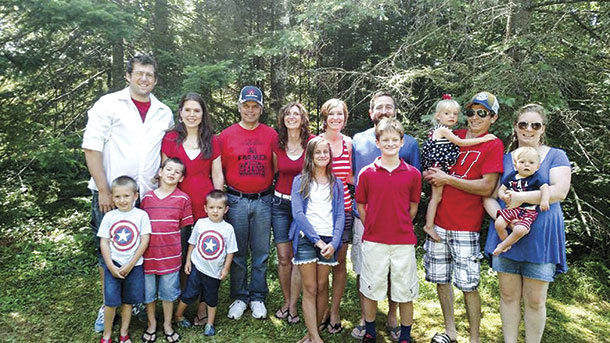
Fustead Holsteins began in 1905 as a wedding gift to Brian Fust’s great-grandparents. Today, it is operated by Brian; his wife, Wendy; two of their children, Jennifer and Tyler; and their spouses, Adam and Shannon. With the family’s growing interest in the dairy, the need to expand and welcome the next generation became apparent.
In 2014, a new 400-head freestall barn was built, complete with maternity pens and a double-12 parlor. The current herd consists of 475 cows with a rolling herd average of 31,500 pounds of milk, 3.85 percent fat and 3.15 percent protein on milking three times a day. In the last decade, the Fusts have focused on genetics and marketing by increasing embryo transfer and in vitro fertilization work on their top animals.
They are exporting embryos to 10 countries including Australia, Canada, China, England, France, Germany, Holland, Italy, Japan and Spain. Fustead Holsteins has had a global impact with Fustead Emory Blitz-ET, Select Sires’ all-time breeding and production bull, selling more than 1.6 million units of semen worldwide. For their breeding success, the Fusts were recognized with the Wisconsin Holstein Association Distinguished Breeder Award in 2012.
Wednesday, Oct. 4, Noon
Hosted by: Oregon Dairy Farm LLC, Lititz, Pennsylvania
Highlights: 475 milking/Community partners
Sponsored by: Innovation Center for U.S. Dairy
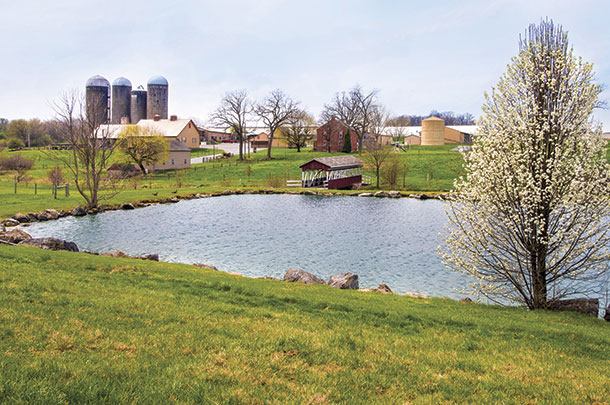
Located in Lancaster County, Pennsylvania, near the Chesapeake Bay, Oregon Dairy Farm LLC is comprised of 525 dry and milk cows and 1,000 acres of corn, soybeans and triticale. Each family member has an active role in the farm’s management.
George Hurst is the general manager, while his daughter Maria and son-in-law Tim Forry oversee finances, employees and the dairy herd. Additionally, George’s son Chad is the crop and forage manager. Since adding a small store to the farm in 1974 to sell milk and produce, the family has embodied the farm-to-fork experience.
Now, with a full-service grocery store, ice cream parlor and award-winning restaurant, Oregon Dairy Farm has become a staple in the community for fresh products and great food. Annually, the dairy welcomes more than 15,000 visitors through various events and school tours.
The farm is also committed to being strong stewards of the land with no-till practices, composting waste from the dairy with food waste from the community and operating the longest-running anaerobic digester in Pennsylvania. To further protect nearby waterways, the dairy utilizes stream bank fencing to prevent erosion, decrease runoff and encourage bio-diversity. These environmental efforts were recognized in 2015 when the farm was presented with the U.S. Dairy Sustainability Award.
Wednesday, Oct. 4, 2 p.m.
Hosted by: Good-Vue Farms, Goodridge, Minnesota
Highlights: 120 milking/Utilizing technology
Sponsored by: Lely

Mike and Linda Hanson with their sons, David, Matthew and Steven, own and manage Good-Vue Farms in Goodridge, Minnesota. Last year, the Hansons completed construction on their new freestall facility with two Lely A4 automatic milking systems and a Lely Vector automatic feeding system.
The Vector, one of the first in the U.S., allows the family to feed each group of lactating cows between eight and 12 batches of feed per day depending on their dry matter intakes. The system utilizes a “kitchen” to automatically create partial mixed rations, leading to the elimination of human error from the mixing, batching and feeding process. The forages used in the partial mixed rations are grown on 2,800 acres, along with cash crops of soybeans, spring wheat and malting barley.
The freestall barn features 120 dual-chamber waterbed stalls topped with shavings for their 90 Ayrshire and 30 Holstein cows. As the next generation returns to the farm, there are plans to convert the former tiestall barn into a new calf facility. Sons Matthew and Steve have recently returned home; David works for his in-laws but stays involved with Good-Vue Farms by selecting and managing the show string.
His wife, Ashley, a veterinarian specializing in embryo transfer, handles the farm’s embryo work. The Hansons’ Ayrshires have topped classes in the International Ayrshire Show at World Dairy Expo and have earned several All-American nominations. The family currently markets embryos and cattle across the U.S.
Thursday, Oct. 5, Noon
Hosted by: Piedmont Jerseys, Lincolnton, North Carolina
Highlights: 250 milking/Jersey genetics
Sponsored by: American Jersey Cattle Association
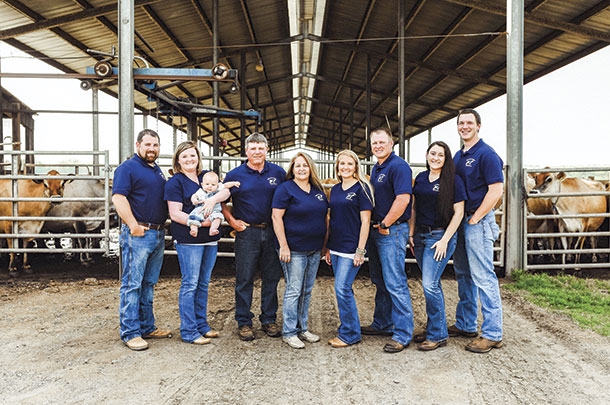
Piedmont Jerseys is one of the oldest registered Jersey herds in North Carolina. Corey Lutz and his family are looking forward to continuing the tradition of Jersey genetics on the family farm as the fifth generation joins the business.
In 1997, Corey and his wife, Bridgette, moved their herd from a conventional dairy facility, where their family had farmed since 1882, to a year-round intensive grazing operation in the neighboring county. Located in a horseshoe bend, the farm is surrounded on three sides by water, which led to the decision to utilize no-till management practices on the farm’s 450 acres.
The herd of 235 cows is milked in a double-eight herringbone parlor and maintains a rolling herd average of 18,438 pounds of milk with 5 percent fat and 3.7 percent protein. Piedmont has bred and developed 273 Excellent cows during its tenure. Currently, the farm is home to 46 Excellent- and 157 Very Good-scoring animals. As genetics are marketed throughout the U.S. and Puerto Rico, Piedmont’s breeding philosophy focuses on cows with good udders, longevity, high milk production and the ability to perform in all dairy systems.
Corey and Bridgette recently formed an LLC to aid in the transition of the farm to their son, James; his wife, Danielle; their daughter, Mandy; her husband, Chris; and their daughter, Olivia.
Thursday, Oct. 5, 2 p.m.
Hosted by: Meier Dairy of Palmer, Inc., Palmer, Kansas
Highlights: 650 milking/Innovation
Sponsored by: Kansas Department of Agriculture
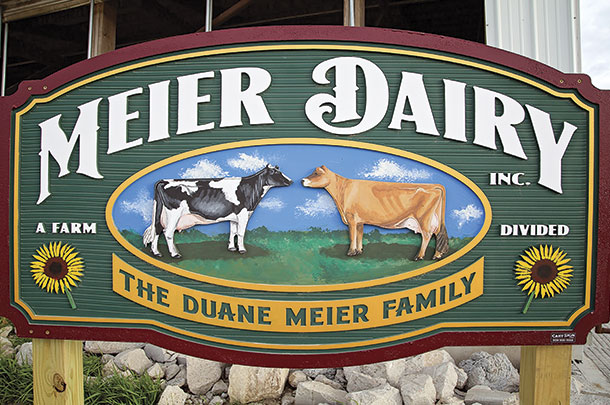
Duane Meier is a third-generation dairy farmer. Together with his wife, Ronda, Duane purchased his family’s farm and a herd of 80 cows in 1978. A decade later, the Meiers expanded to 650 cows and built their current facilities.
Since the beginning, there has been a focus on adopting new technology. After the successful installation of two automatic calf feeders in 2010, the Meier family began researching automatic milking systems. With no dealers in Kansas, the Meiers spent five years trying to secure the automatic milking system to achieve a more consistent and efficient labor performance.
In 2015, their persistence paid off as they retrofitted their facilities and became the first dairy farm in Kansas to utilize this technology in the form of 12 Lely robots. This decision has allowed four of their five children to return to the farm. Dustin is a herdsman, Amanda is an assistant herdswoman, and Micah does farm work and maintenance.
Tony is a herdsman who owns 65 registered Jerseys. In a few short years, his herd has become one of the top 35 herds for Jersey Performance Index in the nation. The combined Jersey and Holstein herd is averaging 2.7 milkings per day and has a rolling herd average of 25,000 pounds of milk with 3.75 percent fat and 3.3 percent protein.
Friday, Oct. 6, Noon
Hosted by: VanBedaf Dairy LLP, Carrington, North Dakota
Highlights: 1,500 milking/First-generation U.S. farm
Sponsored by: Quality Liquid Feeds Inc.
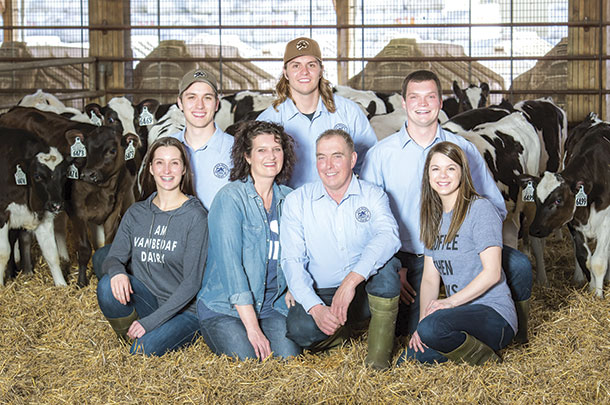
Conny and Corne van Bedaf have dairy farmed in the Netherlands, Canada and now North Dakota. Moving to the U.S. after experiencing expansion limitations in both previous locations, the van Bedaf family has built VanBedaf Dairy LLP from the ground up.
Starting with 800 springing heifers in 2009, today the 1,400-cow herd averages more than 29,000 pounds of milk. This growth was achieved through breeding cattle to top genetics without compromising wellness. Now, with more data available, they utilize genomic testing to continue the herd’s genetic progress.
The van Bedaf family has worked hard to build relationships in the community. In a continued effort, every other year the family opens their doors for LegenDairy, a community appreciation open house.
They also lease dairy calves and heifers to local 4-H members to show. To minimize its environmental impact, the farm collects rainwater from the roofs and wastewater from the parlor to aid in sand separation. The farm also incorporates unique byproducts into the herd’s rations, such as pasta waste. VanBedaf Dairy will welcome two new partners in the operation this year, Conny and Corne’s sons, Piet and Dries.
Friday, Oct. 6, 2 p.m.
Hosted by: Night Hawk Dairy, Stratford, Wisconsin
Highlights: 900 milking/Cow and calf care
Sponsored by: Purina Animal Nutrition LLC
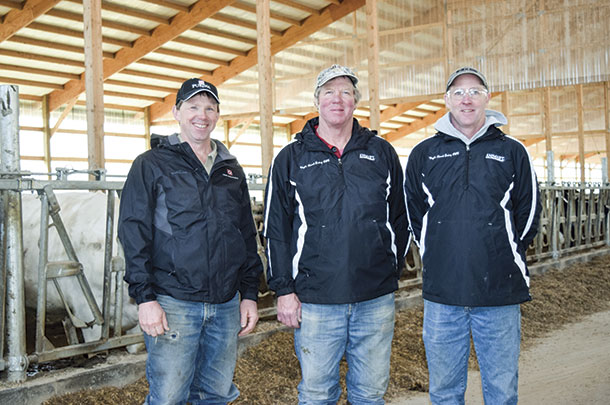
Nearly 100 years after the Leick brothers chose to manage separate farms, their grandsons are again farming together. With both farms in need of updates, Chris and Steve Leick, with their cousins, Peter and Jim Leick, began discussing options of merging their operations. Peter later opted out of the ownership group but assumed responsibility as the herdsman.
He plans to retire in the fall. In 2013, the freestall barn at Chris and Steve’s was expanded and converted into a tunnel-ventilated building, a double-12 parlor was built, and the herds were combined to form Night Hawk Dairy LLC.
With cow comfort in mind, the holding pen also is tunnel-ventilated to maximize comfort. The transition cow barn serves as a “vacation destination” with tunnel ventilation, sand-bedded stalls, cobblestone flooring and natural light for all far-off dry cows, pre-fresh dry cows and heifers, and post-fresh heifers and cows. The transition barn features maternity pens and a fresh cow parlor.
The calves are cared for in a starter nursery and then moved to one of four classroom-style pens with an automatic feeder. At 9 weeks old, calves are moved to group housing with bedding packs for four months. From 6 to 13 months old, heifers are raised in the grower barn and taught to utilize freestalls with rubber mattresses and wood shavings. The decisions the Leicks have made show the commitment to animal health and welfare at Night Hawk Dairy.
Saturday, Oct. 7, Noon
Hosted by: Woods Hill Farms, Turin, New York
Highlights: 743 milking/Expansion
Sponsored by: CRV USA
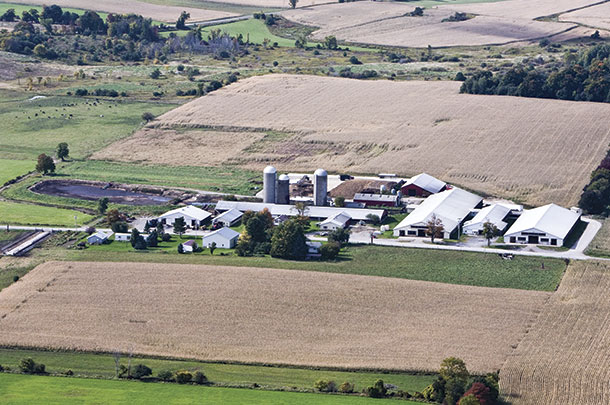
Woods Hill Farms in Turin, New York, began with 134 acres and 60 cows when Ted Seaver purchased it in 1947. Three decades later, a barn fire destroyed most of the buildings, resulting in the Seavers constructing a freestall barn and a double-four herringbone parlor. Since then, steady growth has been a key part of the success at Woods Hill Farms.
At the turn of the century, a new freestall barn was built. A few years later, a new double-16 parlor and a second freestall barn were built to accommodate the growing herd. After numerous land acquisitions, the farm currently consists of 743 lactating cows and 1,540 acres of grass hay, alfalfa and corn.
Mike Branagan joined Ted as a partner in 2008 after working on the dairy for nearly 20 years. After seven years of partnership, Ted passed away and Mike’s wife, Emily, and their son Corey stepped into ownership roles. The two freestall barns total 700 stalls and house a milking herd with a rolling herd average of 28,541 pounds of milk with 4.1 percent fat, 3.1 percent protein and 132,000 somatic cell count.
Calves on the dairy are cared for in group housing before moving to freestalls. Woods Hill regularly opens its doors for local and international tour groups. The farm has also developed a camping area for visitors and conservation land near their duck pond. ![]()



